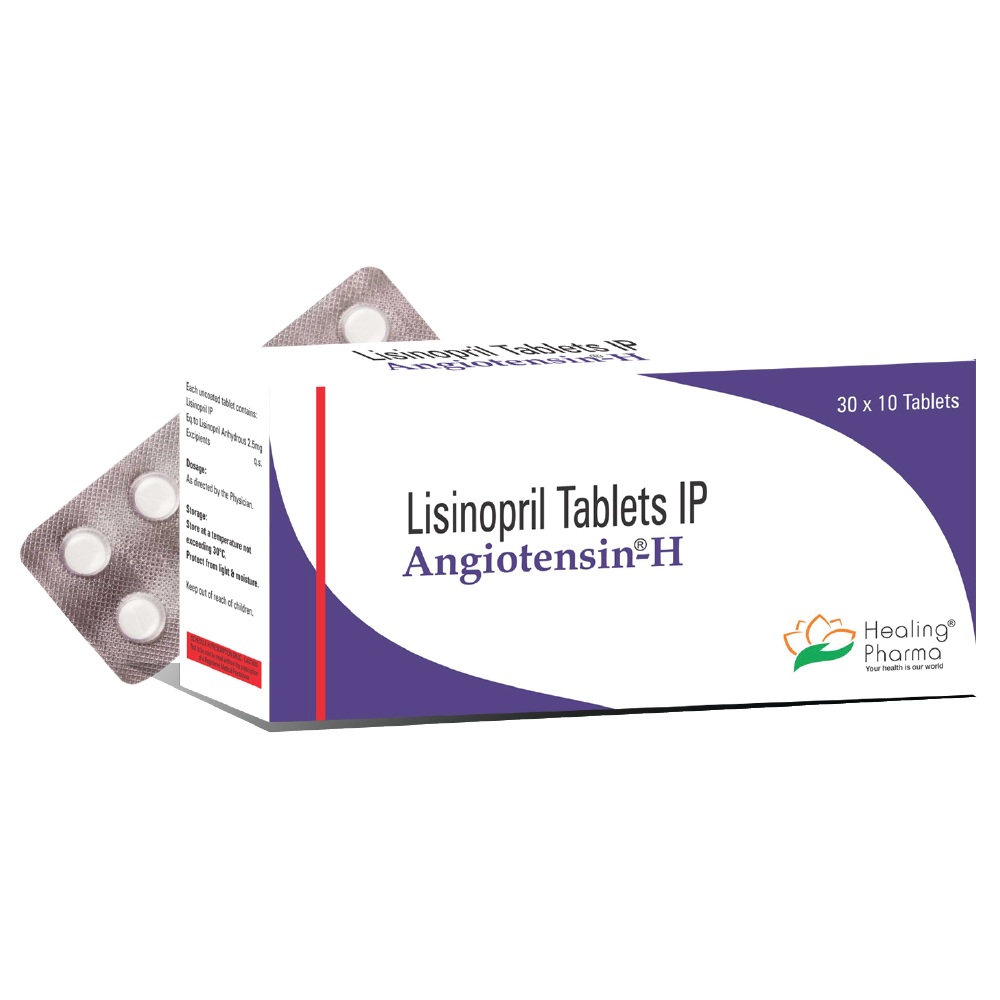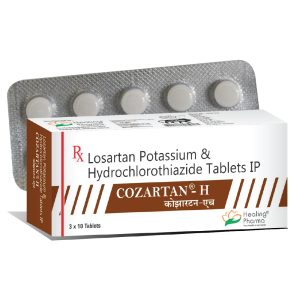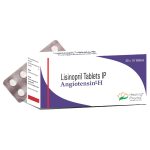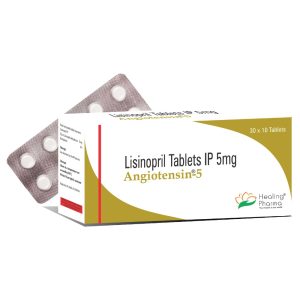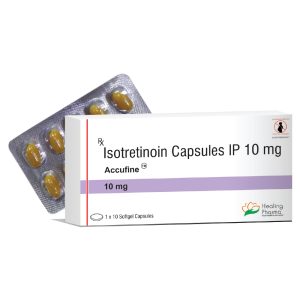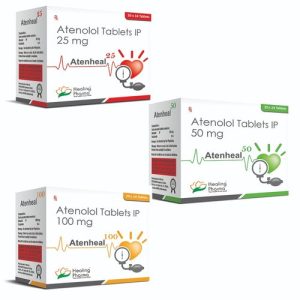| Composition | Lisinopril (5mg) + Hydrochlorothiazide |
| Form | Tablets |
| Packaging Size | 10 |
| Brand Name | Angiotensin H |
| Dosage | 5mg/12.5mg |
| Packaging Type | Strips |
Lisinopril (Angiotensin H) 5 mg/ 12.5 mg tablet is an angiotensin-converting enzyme inhibitor used to keep your blood pressure under control. It helps relax the blood vessels, consequently lowering your blood pressure. It is also used to treat other conditions such as heart failure, heart attack, and kidney damage caused by diabetes.
Drug = Lisinopril
Strength = 5 mg/ 12.5 Mg
Manufacturer = Healing Pharma
How To Take
This medicine may be taken with or without food. Try to take it at the same time each day.
Lisinopril must be taken regularly for it to be effective. Continue taking this medicine even when you feel better. Do not stop taking it unless instructed otherwise, as stopping it suddenly may worsen your condition.
Take Lisinopril precisely as directed by your doctor or according to the instructions on the label. Do not take more or less than instructed by your doctor.
Dosage
Adult: Hypertension: Initial: 10 mg once daily at bedtime. Maintenance: 20-40 mg once daily. Maximum of 80 mg/day.
Heart failure: As adjunct: Initial: 2.5 mg once daily, may increase up to 20-40 mg at a 4-week interval according to clinical response.
Post MI: Initial: 5 mg once daily within 24 hours of the onset of symptoms, followed by 5 mg after 24 hours; then 10 mg once daily for six weeks. Continue treatment in patients developing heart failure.
Diabetic nephropathy; Hypertensive with type 2 diabetes mellitus: Initial: 10 mg once daily. May increase to 20 mg once daily to achieve a sitting diastolic BP <90 mmHg.
Missed Dose
If you miss a dose, skip the missed dose and return to your usual dosing schedule. If you often forget to take your medicine, let your doctor and pharmacist know.
Do not double a dose under any circumstances.
Overdose
Signs of overdose may include the following:
- Hypotension
- Circulatory shock
- Tachycardia
- Palpitations
- Bradycardia
- Hyperventilation
- Renal failure
- Electrolyte disturbances
- Anxiety
- Dizziness and cough
Seek medical help immediately.
Contraindications
People with the following medical conditions should not take Lisinopril:
- History of angioedema related to previous ACE inhibitor treatment
- Hereditary or idiopathic angioedema
- Concomitant use with aliskiren especially in patients with diabetes mellitus or renal impairment (GFR<60 mL/min/1.73 m2)
- Concomitant use with sacubitril
- Pregnancy
Side Effects
Lisinopril may have the following side effects:
- Hyperkalaemia
- Hypotension
- Cholestatic jaundice
- Chest pain
- Syncope
- Cough
- Hematologic effects (e.g., neutropenia, anemia, thrombocytopenia)
- Tachycardia
- Palpitations
- Tinnitus
- Nausea
- Diarrhea
- Vomiting
- Abdominal pain
- Dry mouth
- Constipation
- Fatigue
- Asthenia
- Intestinal angioedema.
- Elevated serum creatinine
- BUN increased
- Electrolyte imbalance
- Arthralgia
- Myalgia
- Headache
- Vertigo
- Paresthesia
- Taste disturbance
- Dizziness
- Hallucinations
- Mood alterations
- Sleep disturbance
- Drowsiness
- Renal dysfunction
- Oliguria
- Anuria
- Impotence
- Gynaecomastia
- Rhinitis
- Sinusitis
- Dyspnoea
- Pruritus
- Rash
- Psoriasis
- Raynaud’s phenomenon
- Flushing
Potentially Fatal:
- Anaphylactoid reactions (e.g., angioedema of the face, lips, tongue, and extremities)
- Arrhythmia
- Severe hypotension
- Rarely, fulminant hepatic necrosis.
Warnings
Do not use Lisinopril in people with the following conditions:
- Allergic reaction
- Pregnancy
- Lactation
Inform your doctor and pharmacist if you are taking any of these medicines:
- Aliskiren
- Sacubitril
- Valsartan
- Doxazosin
- Insulin
- Glibenclamide
- Gliclazide
- Glipizide
- Lithium
- Potassium supplements
- Hydrochlorothiazide
- Spironolactone
- Amiloride
- Aspirin
- Ibuprofen
- Celecoxib
Inform your doctor and pharmacist if you are taking any other medicines, including herbal tonics such as traditional Chinese medicines, supplements, and non-prescription medicines.
This list does not include all medicines that may interact with Lisinopril.
How Does It Work?
Lisinopril is a peptidyl dipeptidase inhibitor which prevents the conversion of angiotensin I to angiotensin II, thereby increasing the activity of plasma renin and decreasing the secretion of aldosterone.
Uses
Lisinopril is used to treat the following conditions:
- Heart failure
- Postheart attack
- Diabetic nephropathy
Special Precautions and Connected Warnings
Take special precautions if you have the following conditions:
- Patient with severe aortic stenosis
- Hypertrophic cardiomyopathy
- Cardiovasculardisease (e.g., ischemic heart disease) collagen vascular disease
- Ascites
- Unstented unilateral and bilateral renal artery stenosis
- Patients undergoing major surgery or during anesthesia
- Black race
- Desensitization treatment (e.g., Hymenoptera venom)
- Renal and hepatic impairment
- Lactation
- Children
- Avoid alcohol
- Cut down on your salt intake. This may help lower your blood pressure and improve your overall health. Speak to your doctor or dietitian about ways to cut down on your salt intake.
Storage Conditions
- Store between 15-30°C. Protect from moisture.
- Store in a cool, dry place away from the reach of children.
- Do not use Lisinopril that is expired or out of date.

